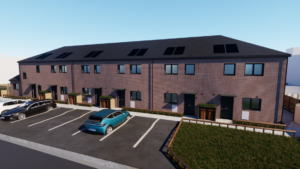NewStart Feature – does selective licensing stop rogue landlords?

More councils than ever are turning to selective licensing to tackle rogue landlords and dismal housing quality in the rental market.
After a landlord applies for a licence they have to take a ‘fit and proper’ person test and pay a fee. It ranges from council to council, with it usually costing between £350 and £1000 and lasting for up to five years.
In return, they’ll face inspections to check if they are adhering to certain health and safety conditions. If the license is breached, landlords could be prosecuted and face fines of up to £30,000.
With local authority budgets slashed to the bone, many are turning to selective licensing as a means of raising the funds to enforce inspections and drive up property standards which have left one in three homes in the cheapest 20% of the private rental sector failing to meet the Government’s ‘Decent Homes Standard.’
However, in some areas that have introduced licensing, prosecution rates have remained rates low with the National Landlords Association saying councils only want to ‘look tough’ rather than tackling the underlying causes of poor quality housing.
So is it an effective tool in stopping rogue landlords?
A captive market
Brighton and Hove City Council will introduce selective licensing in 12 wards in the centre of Brighton from February 2019.
In recent years, the town has proved arable land for landlords with the average rent of a one bedroom flat increasing by almost 10% since 2014.
It’s a captive market and many landlords know it.
The council says this lopsided rental market has left many tenants feeling vulnerable and unwilling to report problems due to a fear of being evicted.
‘There are landlords here who have refused to carry out repairs because they know they can serve a notice and they’ll find someone else,’ says Cllr Tracey Hill, deputy chair of the housing committee at Brighton and Hove City Council.
‘There are good landlords but there are also homes that are not very well maintained,’ she adds.
Cllr Hill argues the council’s ability to address poor quality housing without a licensing scheme has been limited because they currently rely on the tenant to come forward to report issues to the council.
‘A lot of tenants don’t want to do that because they feel vulnerable,
‘They think they might lose their home and they worry that if they were given notice they might not be able to afford to move on.’
In theory, the council has powers it can use through the housing health and safety rating system (HHSRS), however, Cllr Hill says budget cuts have meant they’ve been unable to carry out proper HHSRS inspections.
Brighton and Hove will be charging £460 for a five-year license, which she says will be ringfenced so its only used to inspect properties and go after the landlords who are flouting health and safety laws.
‘If we have licensing we could be proactive in addressing property conditions, but without the funding we are having to be reactive,’ she says.
Enforcement
Gavin Dick of the National Landlord’s Association says many councils who have already introduced licensing are not carrying out regular inspections, and even refusing to prosecute if they have found breaches of the license.
Manchester City Council says they will inspect just 50% of all licenced properties over five years, and following freedom of information requests, Carol Pidgeon AM revealed that in the London boroughs who had introduced licensing, a quarter had failed to prosecute a single landlord for providing unsafe accommodation in 2016/17.
‘It’s political,’ says Mr Dick.
‘They [the councils] want to be seen to be doing something rather than actually doing something.
‘How is it benefitting tenants?’ he adds.
He believes there will always be vulnerable tenants who will be able to be ‘exploited’ by landlords and criminals, and he accuses councils of trying to ‘look tough’ on landlords rather than tackle the root causes of poor quality housing.
‘A lot of councils say “we’ve introduced it and problem solved,” but it’s not,’ he says.
‘Selective licensing doesn’t level the playing field.
‘It effectively levels the playing field for criminals because criminals know the council will be taking resources away from targeting them and actually processing licensing. That’s what happens.’
Mr Dick accepts that there are landlords who fail to adhere to health and safety rules or respond to complaints from tenants.
However, he disagrees that landlord’s are criminals if they don’t follow health and safety laws.
‘It’s not due to criminality,’ he says.
‘It’s due to negligence.’
Before becoming the first council in Nottingham to introduce licensing, Ashfield Council received over 4500 complaints between April 2013 and December 2016 from tenants regarding property disrepair and poor landlord management, with a ‘significant’ number of these complaints coming from tenants in private rented accommodation.
One of the most successful selective licensing schemes in the country has been in the Hexthorpe area of Doncaster.
Within the first year of introducing licensing, the council issued 545 licences.
A small number of properties inspected were of an ‘excellent’ standard with the majority revealing a variety of issues ranging from minor to severe.
Similarly, since they introduced it five years ago, Newham Council has brought 1,225 prosecutions, served 2,834 notices requiring properties to be made safe, and banned 28 landlords from renting in the borough. It has also recovered £3.1m a year in unpaid council tax.
A likely deterrent?
Shelter say 1.15 million families are on council housing waiting lists with just 290,000 social homes made available last year.
Many have been forced into the private rental market, which Mr Dick says is putting undue pressure on landlords.
‘They live chaotic lives,’ he says.
‘The people who have moved from social to private rented accommodation have lost the support which is what they need,
‘Those people cause problems in the community and landlords can’t intervene in their life. If they’re sitting there doing drugs or causing criminality, there’s no power to intervene.’
One of the reasons selective licensing was first introduced back in 2006 was to tackle anti-social behaviour, which Mr Dick says is now being overlooked.
He also accuses certain councils of not prosecuting landlords who breach licenses because they house people that can’t be housed elsewhere.
‘They’re not interested in solving social problems anymore and are only interested in making a profit,’ he says.
‘Why are chief executives at social housing providers on a six-figure salary? How many staff have they got?’
A lack of regular inspections is something the London Renters Union can agree with the landlords on. Portia Msimang of the Union says selective licensing is ‘toothless’ unless the money is invested back into carrying out regular inspections.
‘Councils really need to invest the money from licensing schemes into full inspection regimes for schemes to be fully effective,’ she says.
‘Camden Council inspects every property it licenses and in so doing uncovers many serious problems which landlords are then required to address.
‘If all local authorities were to do likewise, I could wholeheartedly welcome selective licensing.’
Another major worry of renters is that landlords will just transfer the license fee onto them, even though the cost of the license is tax deductible.
The average rent in London is £1640, and according to research from the GMB union, this number is rising three times faster than wages in the capital.
The NLA response isn’t exactly reassuring.
‘Just as any business, whether you are Sainsbury’s or anyone else, if you get an additional cost then you’re going to transfer that cost through. Simple as that,’ says Mr Dick.
Ms Msimang of Renters’ Rights London believes this is disingenuous as the cost of most licenses works out at around £2 a week.
‘There is absolutely no justifiable reason for this costs to be passed on to tenants.
‘Landlords have enjoyed many years of excellent capital growth and good yields,’ she adds.
Professionalising the market
In Brighton, Cllr Hill believes selective licensing will be a means of professionalising the sector.
Selective licensing hasn’t appeared in a vacuum, and she says that it will balance the scales and making renters feel more secure in their home.
‘The problem is landlords have all the power because there is such a shortage,’ she says.
‘There are advantages to landlords. Once you have a license, you know you’re doing everything you’re supposed to be doing.
‘Otherwise, how do you know you’re being a good landlord?’















